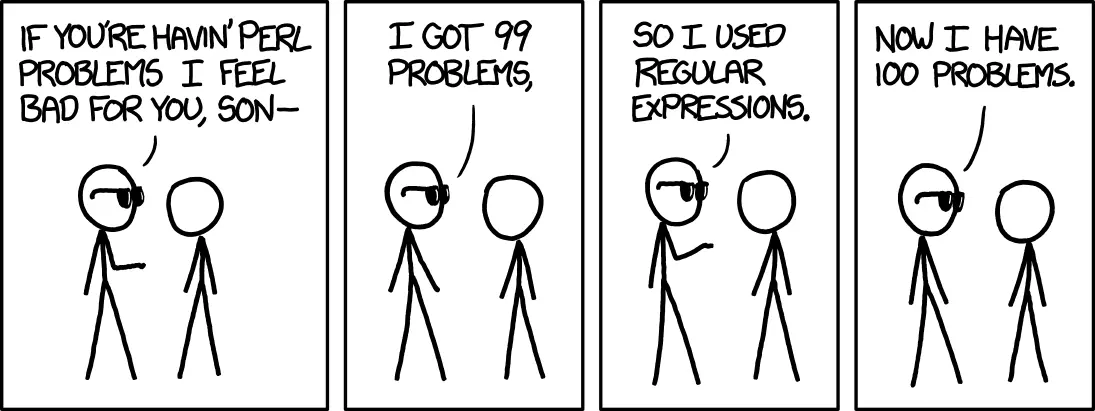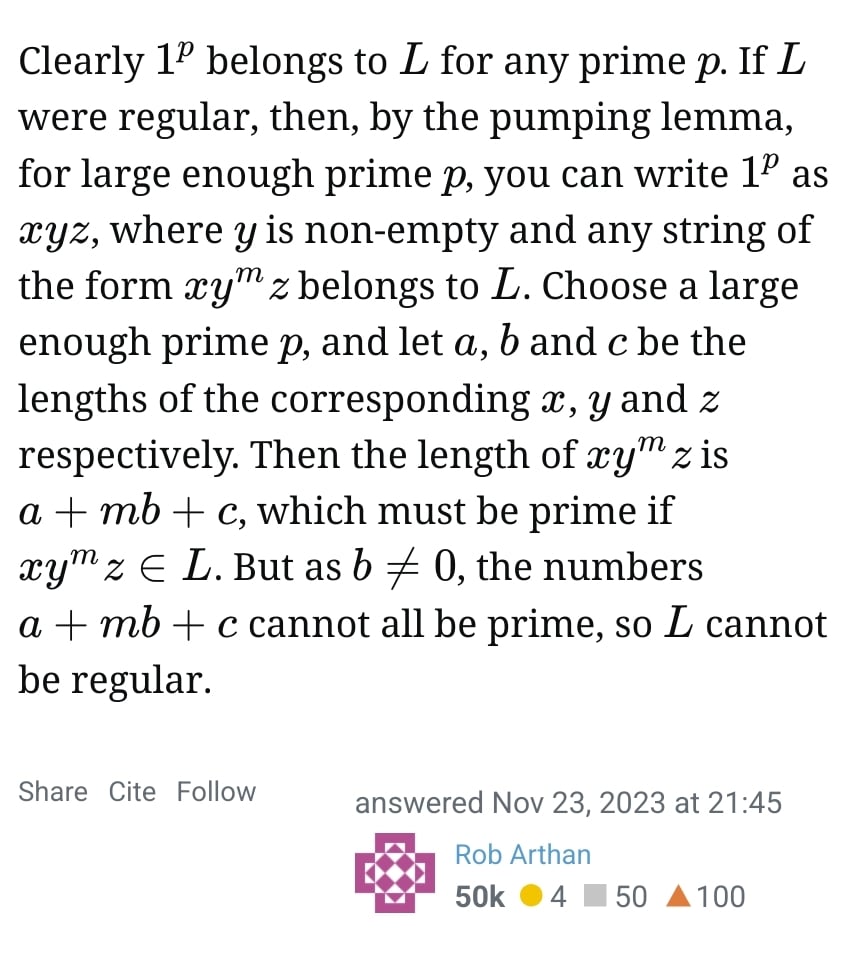^.?$|^(..+?)\1+$
<answer>
Matches strings of any character repeated a non-prime number of times
The answer given in the spoiler tag is not quite correct!
Test case
According to the spoiler, this shouldn’t match “abab”, but it does.
Corrected regex
This will match what the spoiler says:
^.?$|^((.)\2+?)\1+$Full workup
Any Perl-compatible regex can be parsed into a syntax tree using the Common Lisp package CL-PPCRE. So if you already know Common Lisp, you don’t need to learn regex syntax too!
So let’s put the original regex into CL-PPCRE’s parser. (Note, we have to add a backslash to escape the backslash in the string.) The parser will turn the regex notation into a nice pretty S-expression.
> (cl-ppcre:parse-string "^.?$|^(..+?)\\1+$") (:ALTERNATION (:SEQUENCE :START-ANCHOR (:GREEDY-REPETITION 0 1 :EVERYTHING) :END-ANCHOR) (:SEQUENCE :START-ANCHOR (:REGISTER (:SEQUENCE :EVERYTHING (:NON-GREEDY-REPETITION 1 NIL :EVERYTHING))) (:GREEDY-REPETITION 1 NIL (:BACK-REFERENCE 1)) :END-ANCHOR))At which point we can tell it’s tricky because there’s a capturing register using a non-greedy repetition. (That’s the
\1and the+?in the original.)The top level is an alternation (the
|in the original) and the first branch is pretty simple: it’s just zero or one of any character.The second branch is the fun one. It’s looking for two or more repetitions of the captured group, which is itself two or more characters. So, for instance, “aaaa”, or “abcabc”, or “abbaabba”, but not “aaaaa” or “abba”.
So strings that this matches will be of non-prime length: zero, one, or a multiple of two numbers 2 or greater.
But it is not true that it matches only “any character repeated a non-prime number of times” because it also matches composite-length sequences formed by repeating a string of different characters, like “abcabc”.
If we actually want what the spoiler says — only non-prime repetitions of a single character — then we need to use a second capturing register inside the first. This gives us:
^.?$|^((.)\2+?)\1+$.Specifically, this replaces
(..+?)with((.)\2+?). The\2matches the character captured by(.), so the whole regex now needs to see the same character throughout.I upvoted this because I hate it.
Whatever you do, don’t get in a time machine back to 1998 and become a Unix sysadmin.
(Though we didn’t have CL-PPCRE then. It’s really the best thing that ever happened to regex.)
I have to admit that using CL-PPCRE does not really help me understanding the regexp any better. But this may be because I deal with complex regexps for decades now, and I just read them.
I was a sysadmin with some Linux usage in 1998, does that count?
I upvoted you because I consider Perl write only (used to know it, now it inspires readable code as a high priority)
Let’s put it this way: You can produce unreadable code in basically any language. With Perl, it is just a bit easier.
And of course if you have the discipline of a good programmer, even your casual Perl programs should be readable. That’s what differenciates a good programmer from a hacker.
Yeah, I was younger then, perhaps less disciplined, and as always, given enough work you can decompile or regenerate anything. Still, I contend, the nature of Perl, powerful as it was, lent itself to unmaintainable messes, and I’m not talking regex’s, which is why it has faded, no amount of get gud withstanding.
Thanks, I now have insight into my own personal hell for when I die.
Regex is good for a few very specific things, and sysadmins used to use it for goddamn everything. If all your server logs are in lightly-structured text files on a small number of servers, being able to improvise regex is damn useful for tracking down server problems. Just write a shell loop that spawns an
sshlogging into each server and runninggrepover the log files, to look for that weird error.These days, if you need to crunch production server logs you probably need to improvise in SQL and
jqand protobufs or systemd assmonkery or something.But if you actually need a parser, for goodness sake use a parser combinator toolkit, don’t roll your own, especially not with regex. Describing your input language in plain Haskell is much nicer than kludging it.
(This is the “totally serious software engineering advice” forum, right?)
I’ve worked mostly as a data scientist / analyst but regex was being user to identify various things in the SQL database (which was viewed locally via R table). I forget the exact is cases, mostly remembering how complex some of it got… Especially after certain people were using GPT to build them.
And GPT like to make up extra bits not necessary, but my coworkers didn’t exactly have the knowledge to read regex, which lead to nobody really checking it. Now it just gives me anxiety, haha.
Average Matt Parker code
I seem to remember he wrote something in Python that took hours to run, and his community got it down to milliseconds in C.
What took Matt’s code over an entire month to run, viewers optimized so damn hard that the majority of the runtime of the code is just loading the words, so they started optimizing the code to run while the word list was loading. Takes like 4 milliseconds to load the word list, and 2 milliseconds to run the program
People joke about the Parker Square, but he’s unironically the most inspiring public figure imo. The king of Doing The Damn Thing
I remember the time he Excel’d himself.
“abbabba”
“abbabba” doesn’t match the original regex but “abbaabba” does
Good catch! Typo. Fixed.
The answer says “any character” not “any characters”, so it is still correct.
Relevant xkcd:

no
that is correct!
nononono
knowing Matt Parker it only matches prime numbers or multiples of e or something.
looks at <ansewer>
Yeah see?
Matt Parker will destroy us all! (https://youtu.be/GyNbLtiAgj4?si=r77Ef7wm9EZ83T6J)
So, here’s my attempt
The first portion (
^.?$) matches all lines of 0 or 1 characters.The second portion (
^(..+?)\1+$) is more complicated:(..+?)is a capture group that matches the first character in any line, followed by a smallest possible non-zero number of characters such that (2) still matches (note that the minimum length of this match is 2)\1+matches as many as possible (and more than 0) repeats of the (1) group
I think what this does is match any line consisting of a single character with the length
- divisible by some number (due to the more than 0 condition in (2), so that there have to be repeats in the string), that’s not
1(due to the note in (1), so that the repeating portion has to be at least 2 characters long), or- the length itself (due to the more than 0 condition in the (2), so that there is at least one repetition)
Therefore, combined with the first portion, it matches all lines of the same character whose lengths are composite (non-prime) numbers? (it will also match any line of length 1, and all lines consisting of the same string repeated more than one time)
So this is a definite example of “regex” that’s not regular, then. I really don’t think there’s any finite state machine that can track every possible number of string repeats separately.
You got downvoted here but you’re absolutely right. It’s easy to prove that the set of strings with prime length is not a regular language using the pumping lemma for regular languages. And in typical StackExchange fashion, someone’s already done it.
Here’s their proof.
Claim 1: The language consisting of the character
1repeated a prime number of times is not regular.
A further argument to justify your claim—
Claim 2: If the language described in Claim 1 is not regular, then the language consisting of the character
1repeated a composite number of times is not regular.Proof: Suppose the language described in Claim 2 is regular if the language described in Claim 1 is not. Then there must exist a finite-state automaton A that recognises it. If we create a new finite-state automaton B which (1) checks whether the string has length 1 and rejects it, and (2) then passes the string to automaton A and rejects when automaton A accepts and accepts when automaton A rejects, then we can see that automaton B accepts the set of all strings of non-composite length that are not of length 1, i.e. the set of all strings of prime length. But since the language consisting of all strings of prime length is non-regular, there cannot exist such an automaton. Therefore, the assumption that the language described in Claim 2 being regular is false.
By now, I have just one, so thanks for the assist. There’s always that one (sometimes puzzling) downvote on anything factual.
The pumping lemma, for anyone unfamiliar. It’s a consequence of the fact an FSM is finite, so you can construct a repeatable y just by exhausting the FSM’s ability to “remember” how much it’s seen.
Yeah backreferences in general are not “regular” in the mathematical sense.
You can have states point to each other in a loop, no?
If the set of all strings of composite length is a regular language, you can use that to prove the set of all strings of prime length are also a regular language.
But it’s also easy to prove that the set of language of strings of prime length is not regular, and thus the language of strings of composite length also can’t be regular.
Thank you for this. I’ll review this when I can.
Yeah, but in an FSM all you have are states. To do it the obvious way, you need a loop with separate branches for every number greater than 2, or at the very least every prime number, and that’s not going to be finite.
Syntactically valid Perl
Something like
!“A line with exactly 0 or 1 characters, or a line with a sequence of 1 or 3 or more characters, repeated at least twice”!<
You’re misreading the
..+?part. That means 2 or more characters, non greedy.It’s a line with a sequence of two or more characters repeated at least twice.
Only the part after the pipe character. The pipe character works as an “or” operator. RegalPotoo is right.
They said—
A line with exactly 0 or 1 characters, or a line with a sequence of 1 or 3 or more characters, repeated at least twice
Note—
…or a line with a sequence of 1 or 3 or more characters, repeated at least twice
It should be—
…or a line with a sequence of 2 or more characters, repeated at least twice
The regex in the post will match “abab”. Their original description (line 2 of this comment) will not match “abab”.
I agree, you’re right about the part after the pipe and RegalPotoo’s explanation was not entirely correct.
Just waiting for the oppertunity to hide this in prod.
I’m going to assume the answer is a magic square attempt that just isn’t very good
A non prime number of times… It looks like the string of characters could repeat number of times because the whole capture group repeats. I don’t see a prime constraint.
The capture group must be the same each time it repeats, so the number of characters stays the same. So X groups of Y characters = string of length X*Y. X and Y can be anything so any string length that can be made by multiplying two numbers-- which is every non-prime string length-- is matched. 0 and 1 are handled specially at the start.
This is brilliantly disgusting.
Literal interpretation of the regex
The regex matches either a line with a single character or a line with a sequence of two or more characters that’s repeated two or more times. For some examples: the regex matches “a”, “b”, “abab”, “ababab”, “aaaa”, and “bbbbbb”, but does not match “aa”, “bb”, “aaa”, “ab”, “aba”, or “ababa”.
Hint for the special thing it matches
For a line with a single character repeated n times, what does matching (or not matching) this regex say about the number n?
You forgot empty line. Since first part is
^.?$it’s one or zero of any character.
…either an empty string, a single character, or the same sequence of characters repeated more than once?
I could be wrong but I think the
(..+?)portion will either remove a dud or replenish the allowance.No cookie for me I just tried it in Notepad++ and VS code and it matches lines of one characer (first group I think) or the starting of a line that is an at least 2 characters string repeated twice (second group it seems)
so the second group matches abab
abcabc abcdeabce abcdefabcdefNothing about prime numbers really only first repetition gets a match. Very interesting Honestly I used regex from years and never had to retort to something like this ever. I can only imagine it useful to check for a password complexity to not be repeated strings like I do for sites that I just want in and use a yopmail.com mail to register a fake user.
“at least 2 characters repeated [at least] twice” implies the string’s length is divisible by a number greater than 1.
Yes but the match goes for the first repetition the rest of the string isn’t matched no matter the length, again don’t find anything about prime numbers unless I checked something wrong. There is another guy who got it right it seems.
Is there a reason to use
(..+?)instead of(.+)?Yes, the first one matches only 2 more characters while the second matches 1 or more. Also the +? is a lazy quantifier so it will consume as little as possible.
Ah, didn’t know +? was lazy, thanks
I thought, the +? was going to be a syntax error. 🙃
I was like, why specify “one or more” and then make it optional? Isn’t that just .*?
It matches “yo momma”.











